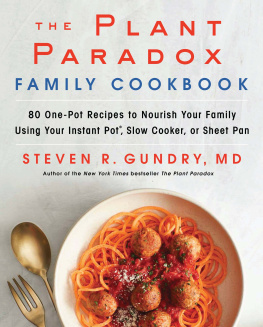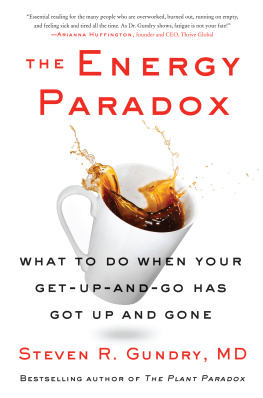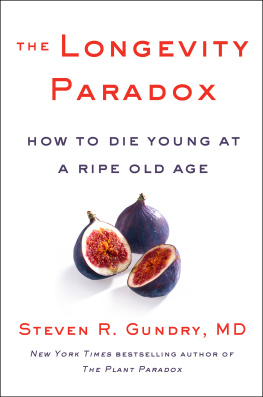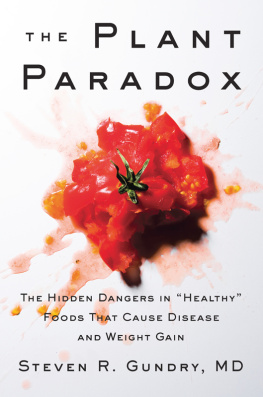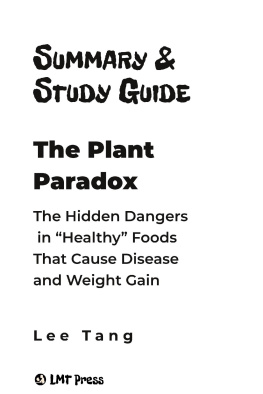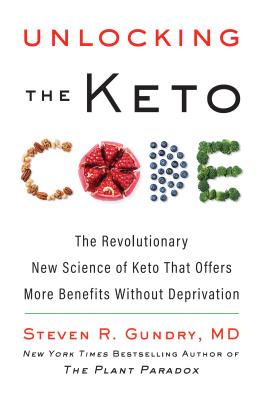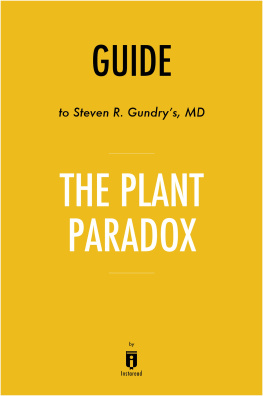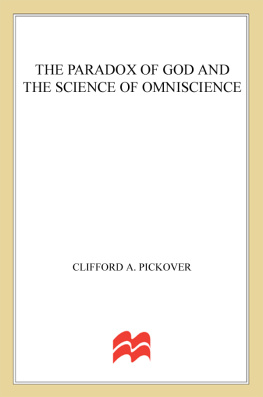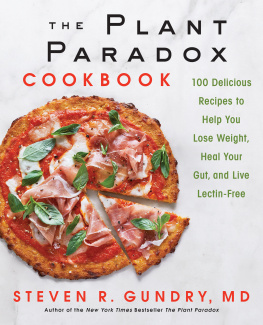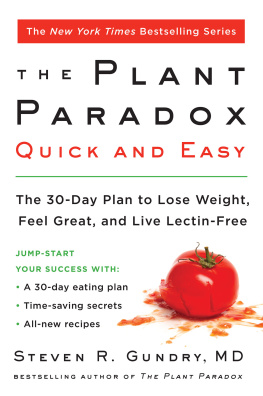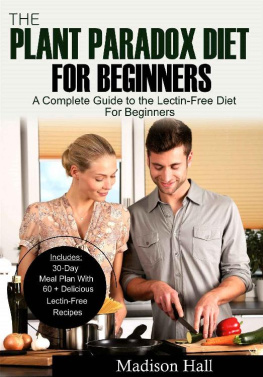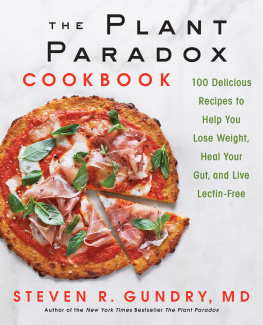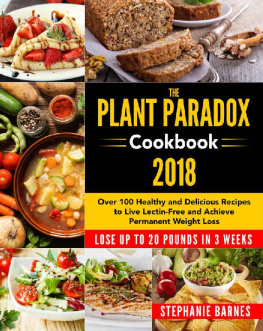Contents
Guide
To our daughters Elizabeth and Melissa, their husbands Tim and Ray, and our grandchildren, Sophie and Oliver, all who demonstrate daily the benefits of the Plant Paradox Program on themselves and their families.
Contents
On the surface, it may seem unusual for a heart surgeon and cardiologist to write a cookbook for families. After all, most cardiologists tend to treat adult patients, often those of advanced age. But what many people dont know is that back when I was a Professor of Surgery at Loma Linda University School of Medicine, I was also a Professor of Pediatrics and a Fellow of the American Academy of Pediatrics (AAP). In addition to seeing my cardiac patients, I also see a great number of families in my current practices in Palm Springs and Santa Barbara, California. Most of the children and young adults I see are suffering from an autoimmune disease that has defied traditional treatments. Other times, my younger patients are brought in by a parent who has regained his or her own health by following my nutritional protocol, and are hopeful their child or children can benefit similarly.
These parents come to see me with a lot of questions, and no small amount of concern about feeding their children a diet that is contrary to what their pediatricians have advised, or even what AAP suggests is optimal. After all, we are told to feed our children cows milk, grains, fruit, and legumes from their first birthday onward. The idea that such foods could be harmfulas I suggest in The Plant Paradox and my subsequent bookscauses parents no small amount of worry. They come to me looking for advice and explanation, wanting to better understand how their children can follow my protocol safely.
In addition, ever since the publication of The Plant Paradox Cookbook, Ive received thousands of emails and messages from readers asking how they can make my recipes more suitable for their familiesand asking for recipes that can be thrown together quickly, without a lot of complicated cooking or difficult-to-find ingredients. These are people who have had success on the Plant Paradox program and are eager to cook nutritious meals everyone in their family will enjoy. They are parents of kids who have turned around their autoimmune diseases and gone off immunosuppressive drugs, who are finding it challenging to keep their childs progress on track for the long run. They are also, very often, working moms and dads who have little to no time to cook every night of the week, and are on a food budget that doesnt allow for lots of fancy ingredients.
The Plant Paradox Family Cookbook is written, first and foremost, with the needs of these patients and readers in mind, as well as for all of you who have successfully followed the Plant Paradox program and restored your health, but wonder: How do I make this a sustainable lifestyle with a family to cook and care for? And perhaps equally important, How can I make sure my kids are getting all the nutrients they need?
Well, dear reader, you have come to the right place. This cookbook is designed to give answers to these questions and more. I want to make the Plant Paradox program a lifestyle you and your family can live with, literally and figuratively.
The reality is that the Plant Paradox plan is a way of eating that works for everyone, regardless of age. Its that simple. Ive documented the positive changes in the bloodwork of thousands of patients in my clinics. Ive seen diabetic kids reverse their diabetes, obese kids slim down, skinny kids put on some much-needed weight for the first time in their lives, and yes, reversed autoimmune diseases, reversed asthma, eczema, and even cystic acne. Ive reported these results and more at major national and international meetings, but the real joy I get is when I receive an email, a letter, or read a review online that shares your positive experiences with the program and your amazing successes.
Finally, this book is also written for all the holdouts who have heard about this crazy Plant Paradox thingthat some plants are out to kill us or at least hurt us, and that the traditional mainstays of a healthy diet like whole grains, low-fat dairy, and legumes are actually some of the worst foods we can consume. Maybe youve been skeptical of my approach, or maybe youve read through the guidelines and simply thought, thats not for me. I understand that change is hard, and I would ask you to consider this: changing your diet and lifestyle doesnt only affect your health. It affects the health and long-term wellbeing of your whole family. My intention with this book is to make it as easy and enjoyable as possible to adapt a healthier lifestyle for every member of your family, without needing to give up the foods and traditions you and your loved ones enjoy. You can still have pizza night, still eat spaghetti and meatballs, pack a sandwich for school lunches, indulge in an ice pop on a hot sunny day. You can celebrate food and enjoy family meals together that are fuss-free, quick to assemble, and provide the very best nutrition for the people you love.

Everything you need is in these pages. If you havent read The Plant Paradox or my other books, not to worryIm going to offer a brief overview of the protocol here so you can jump right in and join the club. Over the next few chapters, well take a closer look at the nutritional needs of kids as well as the basics of the Plant Paradox lifestyle so all of us, old hands or newbies alike, can quickly get up to speed before diving into the kitchen. Welcome to The Plant Paradox Family Cookbook!
In my first cookbook, I opened with these wise words from Michael Pollans elegant start to The Omnivores Dilemma: Eat food. Not too much. Mostly plants.
In essence, I couldnt agree more with this sentiment. A plant-based diet is certainly better for our health than one comprised of poor-quality animal protein and processed foods. But contrary to what many of us have been taught, not all plants are good for us. And in fact, some can be downright harmful to our healthin particular, those that contain a high concentration of proteins called lectins.
And therein lies the paradox: plants can be both friend and enemy, good and bad, nutritious and disease-promoting.
Its likely that some of the foods youve long considered the healthiest for you, and certainly, for your children, are actually those that contain a high concentration of lectins. These foods include most grains, beans and other legumes; certain nuts and seeds; and many fruits, as well as most vegetables with seeds, such as tomatoes, cucumbers, and eggplant (which are botanically fruit).
I know it can feel confusing and contradictory to learn that the foods youve relied on as the cornerstone of a healthy lifestyle are actually undermining your and your familys wellness. So before we go any further were going to take a closer look at lectinswhat they are, what they do, and why you should avoid them.
Predator and Prey
Lets go back some 450 million years, to a time when plants reigned supreme as the only living organisms on the planet. This was the golden age for plantsthey had no predators, and plenty of sunlight and precipitation to grow and proliferate. Now, fast forward about 100 million years, when insects and later, animals, arrive on the scene. What do they want to eat? Plants! But like all living things, plants have an imperative to grow, reproduce, and, well, not diesurvival is encoded in their DNA. So they adapted to their new environment, developing short- and long-term defense strategies to protect themselves from predators. These short-term defense strategies included poisoning, paralyzing, or entrapping their predators to cease an attack immediately. Their long-term defense strategy? Producing chemicals that sicken their enemy, little by little, eventually debilitating them.
Next page
